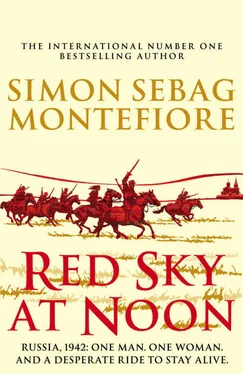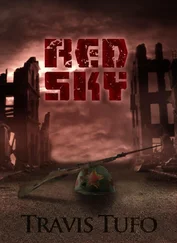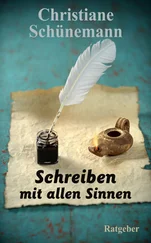Benya could scarcely stand. He tottered in the heat, red sparks rained like meteors behind his eyes, silver hammers beat in his temples and he held on to the doorpost of the stable. It was dark outside, and Benya could only sense the splayed shapes on the ground, the creaking of the gallows.
‘Benya? Do you hear me?’ Kapto shook him. ‘Wake up! Listen!’
‘Don’t torment me now,’ said Benya.
‘No, listen, I mean it, friend. Ride away.’
‘You’re letting me go?’ A glimpse of life, a rising sun, a tunnel with light.
‘We’ve been through such things. Go down that road. The Italians are that way, and they’re kinder than us, and yes… I want you to know that I’m a decent man.’
Benya raised his eyes to the bright eyes of the doctor, to his lineless heart-shaped face with the pointed chin and his tight-curled hair. ‘What about the little girl?’
‘A doctor must care for his patients, first heal and then cherish,’ Kapto said and, for the first time, Benya saw there was something terribly wrong in his open smile and unblinking eyes. ‘I have to keep her close every second. The others are monsters: you’ve seen them. If I let her out of my sight, they might take her—’
‘What were you in the Gulags for? You weren’t a Political, were you?’
‘Easy, now, easy. Don’t say another word, Golden.’
By now they were at the horse lines, and Benya saw Silver Socks waiting for him. He whispered her name and she turned her velvet neck towards him, and her soft muzzle explored his face and he loved that horse: darling Socks. He tried to mount her but he couldn’t raise his leg. Kapto helped him put one foot in the stirrup and hefted him up into the saddle, where Benya stayed precariously swaying, hand on the pommel.
‘Ride away now, just ride,’ said Kapto. ‘Don’t look back. Are you trying to make me hang you in the morning?’
He gave the horse a smack, and Socks loped down the ghostly road.
Late at night in the Kremlin, Svetlana was leafing through the magazines from the West, sent by Comrade Maisky of the London embassy. She was imagining what dresses she would wear when she met Shapiro. Her dresses were made by the special atelier run by the Service Bureau of the NKVD where all the Kremlin wives had their gowns copied from the magazines.
Recently she, Martha Peshkova and Molotov’s daughter had gone there for the first time. All they had to do was rip out a page from the magazine and take it to the atelier in Kitaigorod, up the small staircase to the door marked: ‘Service Bureau’. Abram Lerner was the last old-fashioned tailor in Moscow; he made all those tunics for Stalin himself, each one the same, in grey, sand, green and white. To Svetlana’s delight, Lerner, a dapper Jewish man, balding and slight, had welcomed her, kissed her hand as though she was an emperor’s daughter and introduced her to Cleopatra Fishman, a plump grey-haired Jewish lady, who had measured her for her dress.
A new consignment of magazines had just arrived. Vogue and Bazaar were the best for the dresses but Svetlana also enjoyed the Illustrated London News with its photographs of British aristocrats and even the royal family. She leafed through it and suddenly something caught her eye. It was a photograph that she knew intimately. She raised her eyes from the magazine to the photograph that stood in a frame on the table across the room. It was the same picture: her mother Nadya Alliluyeva Stalina.
Her mother had died almost ten years earlier and Svetlana missed her every day. Svetlana’s English was perfect (she had read Scott Fitzgerald and Hemingway in the original and she had heard that the latter had written a new masterpiece, For Whom the Bell Tolls ) so she started the article, and what she read made her heart palpitate.
‘In November 1932, Nadya, Stalin’s wife, committed suicide in the Soviet leader’s apartment in the Kremlin…’
No! This was not possible. Capitalist lies! Her mother had died of kidney failure; everyone knew that. Her own father had told her this himself.
‘It is said that Nadya shot herself in the heart with a pistol after a raucous dinner in the apartment of the People’s Commissar for War Kliment Voroshilov to celebrate the anniversary of the Revolution…’ the article stated, and Svetlana instinctively knew this was the truth. She had sensed her father’s ambivalence towards her mother but could not understand it. But why had Nadya killed herself? Naturally her father was a difficult man; quite likely he was an impossible husband. He was certainly not attentive. He could be very harsh, and he sucked the oxygen out of every room, leaving no air for anyone else, anyone weaker – but he was also so affectionate to Svetlana. So why had Nadya ended it all? Wasn’t her love for her daughter enough for her?
The door opened and her father came in.
He kissed her forehead. ‘What is it?’ he asked.
‘Papa, there’s something I’ve got to ask you,’ Svetlana said, feeling sick with nerves suddenly.
‘Ask.’
‘Papa, did Mama…?’
His hazel eyes looked right into her. ‘Go on.’
‘Did Mama… How did Mama die, Papa? Really. Please tell me.’
There was a long silence.
‘Who’s been talking to you?’ said Stalin finally. ‘Who’s been blabbing? Tell me who!’
‘I… read in an English magazine that… she… committed… Please tell me…’
But Stalin, standing before Svetlana in his military tunic and baggy trousers tucked into his boots, just looked at her.
‘I loved her,’ he said. ‘But she was fragile. Yes, she killed herself with a little pistol she got from your stupid aunt who bought it in Berlin and gave it to your mother. Yes, I loved her and she let me down, let me down and you and your brother too. I had to bring you up on my own. She left me when I needed her most.’ He hesitated; then he turned away from Svetlana: ‘I’m driving out to Kuntsevo. Goodnight.’
And he was gone.

‘You have a patient, nurse,’ Major Scipione di Montefalcone told Fabiana Bacigalupe, who was working in the village that was now battalion headquarters. ‘We don’t know what he is; he’s wearing a mixture of uniforms. He was found by the patrol lying out on the ground, his horse standing over him. He might be one of the Schuma, I suppose. You better check if they’re missing anyone but it’s chaos over there today.’
The major was a count from Tuscany, the sort you would find only in the grandest cavalry regiments. His father had commanded the Savoy Celere and so, when the war came, Montefalcone chose the family regiment. Fabiana sometimes sensed that with every breath he took, Montefalcone was accompanied by all the cardinals and princes in his bloodline, even though his grandfather had squandered all their castles and paintings. He and his wife lived in a house not much better than a turreted cottage, but he loved to hunt with his retrievers Pushkin and Potemkin. Yes, as he sometimes discussed with Fabiana, he’d always loved Russia, always wished to visit, but not in this way.
‘You know the partisans got Mandryka yesterday?’ he asked now.
Fabiana straightened up. Wearing her white nurse’s uniform with the big Red Cross on the right side, she stood beside the major in the street outside the peasant’s house where she had been staying. ‘I heard.’
‘The man was an animal,’ said Montefalcone, making no attempt to lower his voice in front of his effete batman. ‘But it doesn’t excuse the Soviet partisans, let me make that clear. But Mandryka was worse than a beast. Now there’s a Russian woman lording it over them who’s worse than all of them – she was once a nurse, they say.’
Читать дальше













